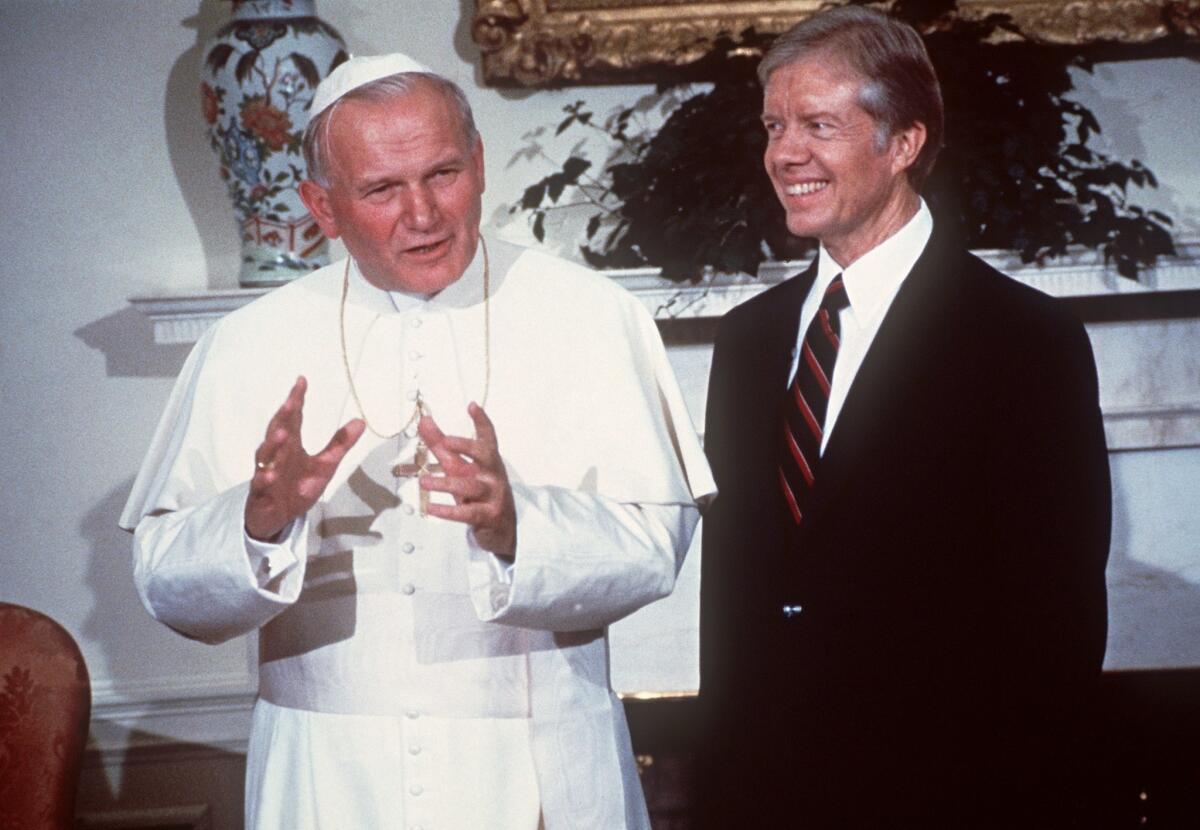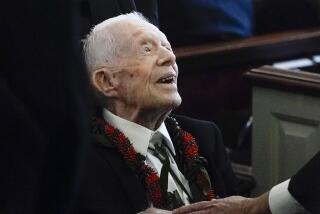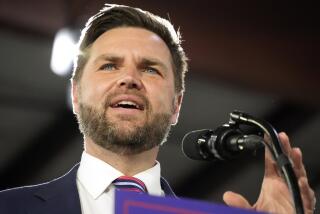Op-Ed: Democrats could learn from Jimmy Carter’s public religiosity

Pope John-Paul II (L) and former US President Jimmy Carter speaking to the media at the White House in Washington in October of 1979.
Jimmy Carter’s cancer diagnosis has prompted a favorable reevaluation of the former president’s legacy from Democrats who spent much of the last two decades distancing themselves from his perceived liberal idealism. His personal integrity, commitment to human rights and peacemaking as president and ex-president have all been rightly lauded. Yet one standout Carter quality is still largely off-limits for those in his party: his very public religiosity.
For most of the 20th century, America’s leaders generally invoked the Almighty in only the loosest of terms. Presidents acted as chief priests of the civil religion — calling on Providence to favor the nation, affirming that citizens’ rights were endowed by a Creator, and asking God’s blessing at the end of speeches. They avoided bringing their private religious convictions into their political lives.
As a candidate in 1976, Carter broke that convention deliberately. He spoke openly of his personal faith, professing himself a born-again Christian — a concept many Americans then only dimly understood. He said that in the wake of his 1966 defeat for the Georgia governorship, he had “established a more intimate relationship with Christ.”
After his unlikely victory, Carter’s faith was clearly reflected in his presidency.
Carter’s faith, then and now, clearly gives him not only a “deeper sense of inner peace” (his words), it has informed his whole political mission. He has always gravitated toward the liberal strands of his Baptist tradition, strands that emphasize care for the poor, racial tolerance and an aversion to violence, citing a quote from theologian Reinhold Niebuhr as an inspiration: “The sad duty of politics is to establish justice in a sinful world.” (Carter broke ties with the Southern Baptist Convention in 2009 over its stances on women, but he remains a devout Baptist.)
As a presidential candidate, Carter tapped into common Christian themes that unite Americans across race, class and geography. He spoke often of love and charity, brotherhood and compassion, framing his campaign through moral imperatives as much as political ones. Although he entered the race as a little-known outsider, this message resonated with an electorate disheartened by recession, Watergate and Vietnam. His promise to “never tell a lie to the American people” — quixotic by today’s standards — reassured the scandal-weary voters of 1976.
After his unlikely victory, Carter’s faith was clearly reflected in his presidency. He said “fairness, not force” should guide international affairs, and gave up the Panama Canal. He likened his push for a national energy policy to “the moral equivalent of war.” Of his fervor to secure a permanent peace for Israel, he later wrote: “I considered this homeland for the Jews to be compatible with the teachings of the Bible, hence ordained by God. These moral and religious beliefs made my commitment to the security of Israel unshakable.”
Americans did not always respond favorably. On July 15, 1979, Carter delivered what came to be known as the “Malaise Speech.” America’s economic woes, he said, stemmed from “a moral and a spiritual crisis.”
“In a nation that was proud of hard work, strong families, close-knit communities and our faith in God, too many of us now tend to worship self-indulgence and consumption,” Carter told the nation. “But ... owning things and consuming things does not satisfy our longing for meaning.” Critics called it pessimism instead of leadership, and Ronald Reagan swept into the White House the next year with a more hopeful message.
Reagan’s success was driven by the defection of evangelicals from Carter’s camp. Although they favored Carter by 21 points in a Gallup poll two months before the 1980 election, many began to feel that he had drifted too far to the left. Two-thirds of white evangelicals ultimately cast their ballots for Reagan.
Yet a striking thing happened. In 1984, Democrats did not make a serious bid to win back religious voters. Instead, they nominated Walter Mondale, Carter’s vice president, who never brought his faith into the public sphere. To the contrary, he told voters that politicians should keep their “nose out of religion.” Reagan, running his Morning in America campaign, handed Mondale the most devastating electoral college defeat in American history, 525 to 13.
The demographics remain abundantly clear. Even though religiosity is dropping in the U.S., according to the Pew Center, more than 70% of Americans still consider themselves Christian, and about 6% follow other faiths. Republicans have vigorously pursued religious voters since Carter’s day, and whenever the Democrats have run candidates uncomfortable with the language of faith, they have been defeated.
Michael Dukakis, Al Gore and John Kerry were all privately religious, but they did not justify their positions through religious morality or references. By contrast, the two Democrats since Carter to secure the White House were adept at using their religious worldview to connect with voters. Bill Clinton often deployed Scripture to reinforce his arguments about poverty, while Barack Obama famously saved his candidacy with a speech tracing America’s present racial discord to the “original sin of slavery.”
If Democrats hope to change minds and hearts in Middle America in 2016, they would do well to recognize the power of sincere religious conviction like Carter’s. If approached with faith in mind, religious moderates might be more open to Democratic positions on issues such as environmentalism, universal healthcare and prison reform. Carter’s remarkable legacy teaches this: Republicans ought not take the support of churchgoing Americans for granted.
John-Clark Levin is a recent graduate of the John F. Kennedy School of Government at Harvard University and an author on politics, technology, and security.
Follow the Opinion section on Twitter @latimesopinion and Facebook
More to Read
A cure for the common opinion
Get thought-provoking perspectives with our weekly newsletter.
You may occasionally receive promotional content from the Los Angeles Times.










